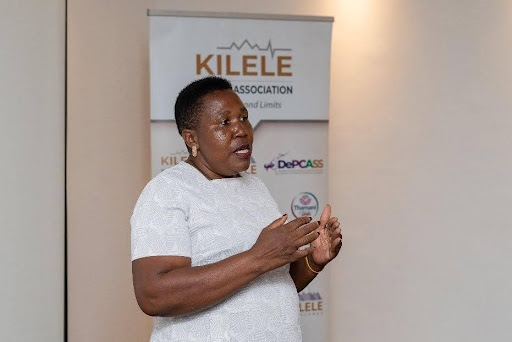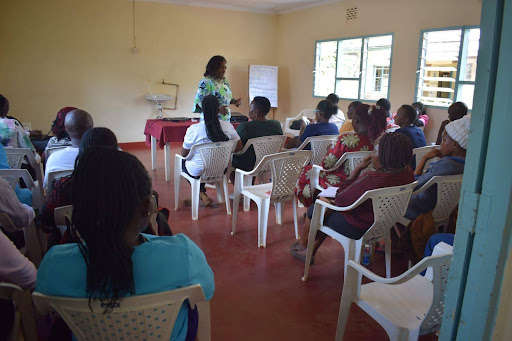By Kigai Priscillah
Embu County, Kenya: In 2012, Judy Wanyoike faced a devastating diagnosis: cervical cancer stage 2B. The news plunged her into a world of despair and isolation. Stigma shrouded her as family members, distanced themselves, unable to comprehend her battle. But amid the darkness, a beacon of hope emerged—her husband, steadfast by her side.
“When I was diagnosed, I lost hope in life,” Wanyoike recalls. “I had seen death because of what I was going through. Family members deserted me from stigma as they had seen my death. They said cancer is associated with death.”
But Wanyoike refused to succumb to despair. With determination fueled by love for her children, she embarked on a path of resilience and defiance. “I decided to give myself hope,” she shares. “I didn’t want to leave my young kids behind without anyone to take care of them as I was the breadwinner.”
In August, Wanyoike underwent surgery, her womb and ovaries removed “I had never seen or heard about a survivor of cervical cancer,” she reflects. “Cervical cancer is preventable and treatable and it is not a death sentence.”
The journey was arduous, marked by bleeding, back pain, abdominal pains, and the loss of intimacy. Yet, through it all, Wanyoike found strength in her faith.
“Currently, I am free of cancer,” she declares.

Wanyoike’s story inspires hope and change. As an advocate, survivor, and Community Health Promoter (CHP), she shares her lived experience to empower others. From Nairobi to Embu and Taita, she raises awareness, dispels myths, and champions preventive measures.
“Advocacy is important as people relate with it and they get encouraged to get screened for early detection and vaccinating their young girls as they are preventive measures,” she affirms
Global Impact of Cervical Cancer
WHO confirms that cervical cancer is the fourth most common cancer in women globally, with around 660,000 new cases and 350000 mortality rates in 2022 in low- and middle-income countries.
Current estimates by the HPV Information Centre indicate that every year 5236 women are diagnosed with cervical cancer and 3211 die from the disease in Kenya, and it ranks as the 2nd most frequent cancer.
According to the WHO, persistent Human Papillomavirus (HPV) infection of the cervix if left untreated, causes 95% of cervical cancer. It takes 15–20 years for abnormal cells to become cancer, but in women with weakened immune systems, such as HIV, this process can take 5–10 years.
In 2020, the WHO launched the Global strategy to accelerate the elimination of cervical cancer as a public health problem.
WHO Global Strategy 2020 is to have 90% of girls fully vaccinated with the HPV vaccine by the age of 15 years. While 70% of women are screened with a high-performance test by 35 years of age and again by 45 years of age and 90% of women identified with cervical disease receive treatment
Organizations at the Forefront
Organizations like the KILELE Health Association stand at the forefront, spearheading efforts to eliminate cervical cancer in Kenya and beyond. Through the Thamani Yetu project, KILELE is bringing hope and change to communities in Embu County.
The Thamani Yetu project launched in February 2023, aims to enhance cervical cancer prevention measures in Embu County, Kenya. With a focus on engaging 40,000 community members, the project seeks to increase awareness, improve access to vaccination and screening services, and demystify cervical cancer in local communities.
The Thamani Yetu project has three key objectives including Advocate for the implementation of the WHO 90-70-90 targets in Mbeere North Sub-County, Embu County.
The second objective is to promote access to HPV Vaccination and Cervical Health Screening for early detection in target communities.
The third objective is set up a community-led navigation system for ease of access to service across the cancer care continuum.
Rita Njiru, Project Officer at KILELE, highlights KILELE’s commitment to cervical cancer elimination. “For a year now, KILELE Health has been coming up with initiatives to eliminate cervical cancer in Embu County,” she explains. “We have trained CHPs in raising awareness and dispelling myths around cervical cancer, as they provide community members with information about the disease, and the importance of early detection and prevention.”
“We have also worked with survivors who tell their lived experiences during outreach programs to show cervical cancer is not a death sentence”
She added that KILELE Health is empowering communities with knowledge and awareness about screening and vaccination, dispelling myths surrounding cervical cancer, and fostering a culture of early detection and prevention.

Hon. Jamal Runyenjes, County Executive Commissioner Officer of Embu County, emphasizes the importance of collaboration in the fight against cervical cancer.
“We have partnered with organizations like KILELE Health Association, to conduct cervical cancer screening for women and vaccination for girls within the community, through outreach programs and mobile clinics” he states.
“We empower healthcare providers in the hard-to-reach facilities to offer screening and treatment services, particularly those in areas where there are barriers when accessing healthcare.”
As of 2024, Hon. Jamal says 61% of girls aged 9-15 years have received the HPV vaccine, which is offered free of charge in healthcare facilities, 46% of women between 25-49 years have been screened and 42% of those found with invasive cancer navigated for treatment in Embu County.
The role of Community Health Workers
According to the National Institute of Health, Community Health Workers (CHWs) play a crucial role in advocating and mobilizing community members to take action against cervical cancer.
“These outreach programs are essential” Joan Wangari, a CHP emphasizes. “They provide a platform for open dialogue and discussion, allowing community members to ask questions, share their concerns, and learn from each other’s experiences. By fostering a culture of knowledge-sharing and empowerment, we’re breaking down barriers to cervical cancer awareness and encouraging proactive health-seeking behaviors.”
To underscore the importance of community-led initiatives in the fight against cervical cancer, Mary Chege, an oncology nurse specializing in women’s health, highlights the significance of projects like Thamani Yetu. “Community engagement is vital in addressing cervical cancer,” Chege asserts. “By bringing screening services and education directly to the people, projects like Thamani Yetu are instrumental in saving lives and empowering communities to take control of their health.”
Chege concluded by saying initiatives like engaging community members, empowering survivors, and fostering partnerships with stakeholders, not only save lives but also transform perceptions surrounding cervical cancer.
“As we look to the future, let us continue to support and champion efforts to eliminate cervical cancer, recognizing the critical role of community-led initiatives in achieving this goal. Together, we can ensure that every woman and girl has the opportunity to lead a healthy, cancer-free life and that no one faces the devastating impact of cervical cancer alone.”













